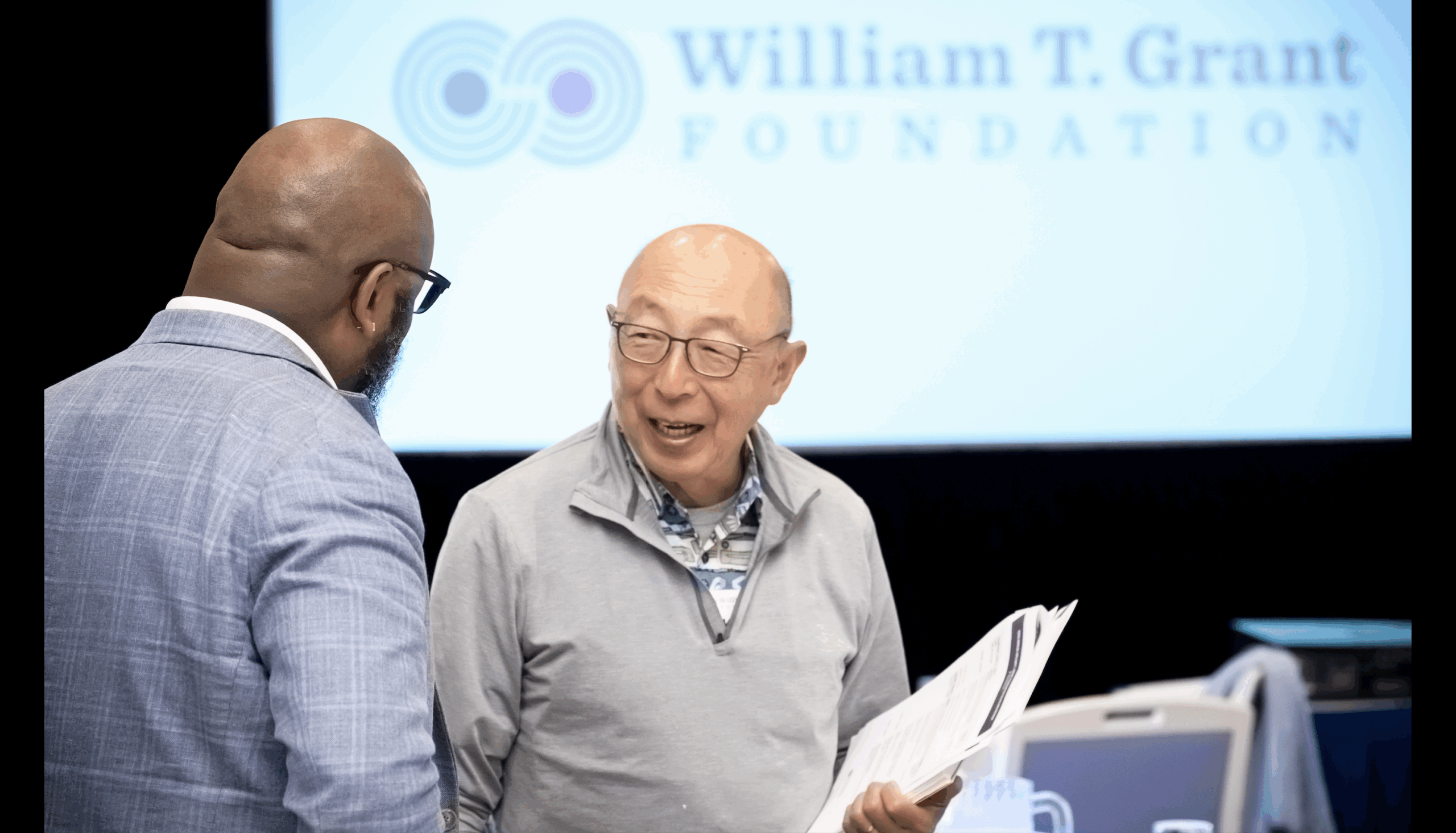The Foundation is pleased to announce that three research grantees and three William T. Grant Scholars have been awarded grants to support their development as mentors to junior researchers of color. The awardees will mentor promising doctoral students and post-doctoral fellows in enhancing their methodological skills, publication records, and career networks.
The mentoring grants program is designed to help current Foundation grantees hone their skills and abilities as mentors and to support junior scholars of color career development. The award encourages grantees to be strong mentors attuned to the career development challenges disproportionately faced by their junior colleagues of color.
This program is as much about improving mentoring skills as it is about improving the research careers of mentees
Applicants to the program assess their current strengths and weaknesses as mentors and propose goals for improving their mentoring skills. They and their mentees also assess the mentees’ strengths and areas for growth and design a mentoring plan that will strengthen the mentees’ potential for a successful research career.
The award encourages grantees to be strong mentors attuned to the career development challenges disproportionately faced by their junior colleagues of color.
“One thing that’s distinctive about this program is that it’s as much about improving mentoring skills as it is about improving the research careers of mentees,” said Melissa Wooten, the program officer that oversees the program. “In addition to supporting the dyads throughout the duration of their grant, the Foundation holds an annual Mentoring Meeting that focuses on career exploration and the mentees’ research and coordinates consultations with experts in mentoring across difference.”
2023 Mentoring Grants
Rachel Feldman, NORC at the University of Chicago; Johanna Quinn, Fordham University
Rachel Feldman and Johanna Quinn are early-career research grantees who are examining how racial ideology, organizational structures, and individual schemas influence the development and enactment of college and university equity plans. Feldman currently supervises multiple staff members, three of whom identify as people of color. Quinn has mentored two Black women doctoral students. With their mentoring grant, Feldman and Quinn aim to engage in collaborative mentoring and to develop the skills to establish the trust that effective mentorship requires. Together they will develop a collective mentoring framework that models and supports the joint decision-making processes guiding their research. Their mentee, Alannah Caisey, is a Black postdoctoral fellow at NORC at the University of Chicago. Caisey’s program of research focuses on how Black women educators dedicated to liberatory pedagogies effect change among Black students. Caisey’s goals for the award include preparing her dissertation for publication, identifying external funding opportunities to support her independent scholarship, and providing research assistance on Feldman and Quinn’s Foundation-funded project. Caisey’s research will support analysis of qualitative interviews. With Feldman and Quinn’s assistance, Caisey will develop codebooks, train graduate research assistants to use the codes, and ensure inter-rater reliability.
Sophia Rodriguez, University of Maryland College Park
Sophia Rodriguez is a William T. Grant Scholar currently investigating how schools and community-based organizations facilitate the educational success and social inclusion of recently arrived immigrant students. She has mentored twenty-five doctoral students, nineteen of whom identified as students of color. Rodriguez’s goals include developing additional skills to support the junior scholars of color on her research team and to assist her college’s efforts to improve mentoring structures of support. With this grant, Rodriguez will share what she learns about mentoring with her department chair and dean and host a brown bag lunch series to share research and key learning about mentoring with other faculty and graduate students. Rodriguez’s mentee, Lisa Lopez-Escobar, is a Latina doctoral student in her second year at the University of Maryland College Park. Lopez-Escobar’s goals include enhancing her capacity to use participatory action methodologies to interrogate how community-school partnerships serve as spaces of belonging for Latinx immigrant youth, learning to navigate relationships with community-based organizations, and disseminating research in ethical and accessible ways. In addition, Lopez-Escobar will provide research assistance for Rodriguez’s Scholars project while developing a participatory action research component that positions youth as agents and co-thinkers of how community-based organizations can increase belonging. With Rodriguez’s counsel on study design and data collection, Lopez-Escobar will recruit youth and work with them to collectively draft research questions, methods, and analytic techniques that explore factors that enhance their sense of belonging.
Niloufar Salehi, University of California, Berkeley
Niloufar Salehi is a William T. Grant Scholar who is studying how to leverage community participation in the development of a software system to ensure that school assignment algorithms reduce rather than exacerbate inequality. She is currently advising seven doctoral students, five of whom identify as women of color. Salehi’s goals for her mentoring grant include developing strategies to effectively mentor and train graduate students of color as they navigate academic culture. To do so, Salehi will solidify her burgeoning mentoring philosophy that emphasizes providing actionable feedback, helping students set realistic goals, and empathizing with the unique issues facing researchers of color. Salehi’s mentee, Angela Jin, is an Asian American doctoral student in her second year at the University of California, Berkeley. Jin’s goals include examining different methods for enabling stakeholder participation in the design of algorithmic software systems, learning the survey and experimental methodologies necessary to study human computer interaction, and establishing reading and time management habits that will support her research career. Jin will provide research assistance for Salehi’s Scholars project while exploring questions of how the language that people use to express their preferences within algorithmic student assignment systems shapes opportunities for meaningful participation. Through weekly research meetings, Salehi will support Jin’s efforts to design and implement controlled experiments that aim to isolate how various characteristics of a student assignment preference language impact parents’ ability to express their family’s educational needs.
Gabriela Stein, University of North Carolina at Greensboro
Gabriela Stein is a research grantee studying whether an intervention that aims to improve parental skill and confidence in having racial-ethnic socialization conversations increases their children’s ability to cope with discrimination and develop a strong racial and/or ethnic identity. She has mentored fourteen doctoral students, twelve of whom identified as students of color. In addition, of her 84 peer-reviewed publications, 28 were first-authored by graduate students. Stein’s goals include more fully integrating financial justice into her mentorship and administrative leadership. With this grant, Stein will advocate for systemic change at the department, college, and university levels to remove barriers for those with less financial stability than she experienced as a graduate student. Stein’s mentee, Casandra Gomez-Alvarado, is a Mexican American doctoral student in her second year at the University of North Carolina at Greensboro. Gomez-Alvarado’s goals include identifying cultural resources that support youth’s resiliency in the face of racial discrimination and developing facility with the quantitative, observational, and community engaged methods necessary to capture the culturally salient factors that influence youth mental health. Gomez-Alvarado will provide research assistance on Stein’s Foundation-funded project and use it to explore questions pertaining to parental influence on youth mental health outcomes. Stein will mentor Gomez-Alvarado in using observational designs. Gomez-Alvarado will employ this methodology to identify key cultural protective factors that make preparation for bias messages more effective for youth of color and to assess if this preparation results in better mental health outcomes for the youth.
Theresa Stewart-Ambo, University of California, San Diego
Theresa Stewart-Ambo is a William T. Grant Scholar who is examining the characteristics of initiatives across universities that influence the educational outcomes of Indigenous youth. She has served on twelve dissertation committees and mentored Indigenous students in education studies. Stewart-Ambo’s goals for her mentoring grant include developing a mentoring framework that marries doctoral program milestones with Indigenous ways of knowing. She intends to emphasize non-hierarchical mentorship models and prepare ethical and community-engaged scholars who are assets to their communities. Stewart-Ambo’s mentee, Chenoa Pellytaay Aschoff Musillo, is an Indigenous doctoral student in their third year at the University of California, San Diego, and a member of the Kumeyaay community whose lands the university occupies. Musillo’s goals include strengthening their existing knowledge of research practices and designing research protocols rooted in decolonial, queer, and antiracist frameworks. Musillo will work with the Kumeyaay community to develop a dissertation that explores what tribal members and descendants believe San Diego public school teachers should teach about Indigeneity. Stewart-Ambo will support Musillo’s progress toward degree completion by advising the development of the literature review and research proposal that will constitute the dissertation project.
Fernando Tormos-Aponte, University of Pittsburgh
Fernando Tormos-Aponte is a research grantee examining whether policing reforms prompted by the Black Lives Matter movement have led to a reduction in the number of young men of color killed by police. In addition, Tormos-Aponte has received funding from the National Science Foundation’s (NSF) Research Experience for Undergraduates program to form the Minority Graduate Placement Program (MIGAP). MIGAP places undergraduates in graduate programs and provides them with their first research experience. This program is a part of a pilot for an NSF INCLUDES proposal that will fund a nationwide network of graduate placement programs for students from underrepresented backgrounds and with a focus on supporting mentors and mentees in Minority Serving Institutions. Both efforts exemplify Tormos-Aponte’s approach to building infrastructures that support mentoring. Tormos-Aponte’s goals for his mentoring grant include developing the skills needed to effectively mentor junior scholars to achieve their self-defined ambitions. To do so, Tormos-Aponte will leverage his infrastructure approach to equip mentees with the skills to fulfill their self-defined aspirations. Tormos-Aponte’s mentee, Shawana Lachir, is a Ghanaian American postdoctoral fellow at the University of Pittsburgh. Lachir’s program of research focuses on the development of legal cynicism among Black adolescents exposed to police presence in their schools. Lachir’s goals include preparing her dissertation for publication, broadening her data collection and analysis skills, identifying external funding opportunities to support her independent scholarship, and serving as collaborator on Tormos-Aponte’s Foundation-funded project. Lachir will collaborate with Tormos-Aponte to collect quantitative data on Black Lives Matter movement features and policing policies and outcomes, and to survey police departments across the United States.







